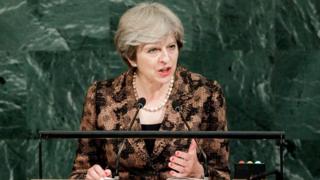Theresa May warns tech firms over terror content
 |
| Photo credits: EPA |
Technology companies must go "further and faster" in removing extremist content, Theresa May has told the United Nations general assembly.
The prime minister will also host a meeting with other world leaders and Facebook, Microsoft and Twitter.
She will challenge social networks and search engines to find fixes to take down terrorist material in two hours.
Tech giant Google said firms were doing their part but could not do it alone - governments and users needed to help.
The prime minister has repeatedly called for an end to the "safe spaces" she says terrorists enjoy online.
Ministers have called for limits to end-to-end encryption, which stops messages being read by third parties if they are intercepted, and measures to curb the spread of material on social media.
At the general assembly, the prime minister hailed progress made by tech companies since the establishment in June of an industry forum to counter terrorism.
But she urged them to go "further and faster" in developing artificial intelligence solutions to automatically reduce the period in which terror propaganda remains available, and eventually prevent it appearing at all.
"This is a major step in reclaiming the internet from those who would use it to do us harm," she said.
Together, the UK, France and Italy will call for a target of one to two hours to take down terrorist content wherever it appears.
Internet companies will be given a month to show they are taking the problem seriously, with ministers at a G7 meeting on 20 October due to decide whether enough progress has been made.
Kent Walker, general counsel for Google, who is representing tech firms at Mrs May's meeting, said they would not be able to "do it alone".
"Machine-learning has improved but we are not all the way there yet," he told BBC Radio 4's Today programme, in an exclusive interview.
"We need people and we need feedback from trusted government sources and from our users to identify and remove some of the most problematic content out there."
Asked about carrying bomb-making instructions on sites, he said: "Whenever we can locate this material, we are removing it.
"The challenge is once it's removed, many people re-post it or there are copies of it across the web.
"And so the challenge of identifying it and identifying the difference between bomb-making instructions and things that might look similar that might be perfectly legal - might be documentary or scientific in nature - is a real challenge."
A Downing Street source said: "These companies have some of the best brains in the world.
"They should really be focusing on what matters, which is stopping the spread of terrorism and violence."
Technology companies defended their handling of extremist content after criticism from ministers following the London Bridge terror attack in June.
Google said it had already spent hundreds of millions of pounds on tackling the problem.
Facebook and Twitter said they were working hard to rid their networks of terrorist activity and support.
YouTube told the BBC that it received 200,000 reports of inappropriate content a day, but managed to review 98% of them within 24 hours.
Addressing the UN General Assembly, Mrs May also said terrorists would never win, but that "defiance alone is not enough".
"Ultimately it is not just the terrorists themselves who we need to defeat. It is the extremist ideologies that fuel them. It is the ideologies that preach hatred, sow division and undermine our common humanity," she said.
BBC

Comments
Post a Comment